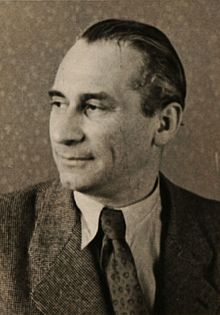Karel Ančerl
Karel Ančerl (originally Antscherl , born April 11, 1908 in Tučapy , Austria-Hungary ; died July 3, 1973 in Toronto , Canada ) was a Czech conductor . He was head of the Czech Philharmonic for many years .
biography
Karel Ančerl was born into a wealthy Jewish family and became a violinist member of the orchestra in his home community when he was eleven. Against his parents' wishes, he studied composition with Jaroslav Křička , conducting with Pavel Dědeček , and drums at the Prague Conservatory . Alois Hába from New Tönn and the then chief conductor of the Czech Philharmonic Václav Talich had a great influence on him during this period .
From 1931 to 1933 Ančerl led the orchestra of the avant-garde theater Osvobozené divadlo and was then radio conductor until 1939 . After the invasion of the Wehrmacht and the annexation of the Czech Republic , he lost all offices and was deported to Theresienstadt concentration camp in 1942. The footage of the Nazi propaganda film Theresienstadt shows him in a scene in 1944 in which he was forced to conduct the concentration camp orchestra. As the only one of his family and almost all of the actors in the film, he survived the subsequent deportation to the Auschwitz concentration camp .
After the end of the Second World War, Ančerl u. a. at the Prague Opera on May 5 as artistic director before becoming chief conductor of the Prague Radio Symphony Orchestra on September 1, 1947.
In October 1950 Ančerl was appointed artistic director of the Czech Philharmonic Orchestra, which he secured a top position among the orchestras of the Eastern Bloc in the following years until 1968 and brought invitations all over the world. He expanded the repertoire primarily to include modern music ( Schönberg , Bartók , Britten ) and devoted himself to promoting unpopular composers from his home country such as Bohuslav Martinů .
After the crackdown on the Prague Spring , Ančerl emigrated to Canada in August 1968, where he directed the Toronto Symphony Orchestra until 1972 . His grave can be found in the Vyšehrad cemetery in Prague.
Discography
The typical colors of his orchestra, often described as "dark", and Ančerl's interpretive achievements were recorded on a 42-volume CD edition by Supraphon and published from 2002 under the name Karel Ančerl Gold Edition . These recordings also take into account lesser-known Czech compositions (e.g. “In the Tatra” by Vítězslav Novák or the “Seven Reliefs” by Jarmil Burghauser ).
Since the beginning of the CD era, the French classical label Tahra has released live recordings with various orchestras under the direction of Ančerl, which provide an overview of its repertoire.
literature
- Jaroslav Bužga: Ančerl, Karel. In: Ludwig Finscher (Hrsg.): The music in past and present . Second edition, personal section, volume 1 (Aagard - Baez). Bärenreiter / Metzler, Kassel et al. 1999, ISBN 3-7618-1111-X , Sp. 627–628 ( online edition , subscription required for full access)
Web links
- Literature by and about Karel Ančerl in the catalog of the German National Library
- Literature and other media by and about Karel Ančerl in the catalog of the National Library of the Czech Republic
- Website about Ančerl , in English
- Documents on Karel Ančerl in the collections of the Jewish Museum in Prague
- Ančerl, Karel. In: Thesienstadt Lexikon.
- Karel Ančerl in the Lexicon of Persecuted Musicians of the Nazi Era, LexM, detailed biography
Individual evidence
- ↑ Karel Ančerl's biography , English
| personal data | |
|---|---|
| SURNAME | Ančerl, Karel |
| ALTERNATIVE NAMES | Antscherl, Karel (different spelling); Antscherl, Karl (maiden name) |
| BRIEF DESCRIPTION | Czechoslovak conductor |
| DATE OF BIRTH | April 11, 1908 |
| PLACE OF BIRTH | Tučapy , Austria-Hungary |
| DATE OF DEATH | 3rd July 1973 |
| Place of death | Toronto , Canada |
